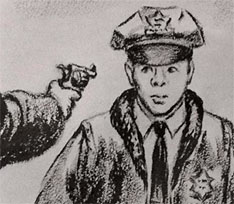
Thirty years after Tsukamoto's death, a Berkeley investigator re-opened his case. What's the status?
The Berkeley investigator, Lieutenant Russell Lopes, encouraged the California state attorney general to take on the case. They sat on it for a year, then this past spring, they declined to hold a grand jury hearing. Lopes no longer works for the Berkeley police, so in effect, the case is closed.
Did you contact the Tsukamoto family when you learned that?
I did. They're obviously disappointed. They put a lot of hope into this; for 32 years, they didn’t hear much at all about the case. Then in 2002, Lopes decided to re-open up all cold murder cases. In two years, he made progress with the Tsukamoto case and made arrests. In 2005, he made more arrests. Everyone thought this was the big break, so to have it go nowhere is excruciatingly painful for the family.
What made this murder case so difficult to solve?
It's a tricky case. The people present at the crime scene were Ron Tsukamoto, the shooter and a third witness. The witness died eight years after Ron’s murder, in 1978. Other witnesses saw pieces of the crime, but they’ve all passed away.
How do you learn about the case?
In 2005, the Berkeley police had made a second set of arrests. If it hadn’t been for those arrests, I never would’ve known about the case. I read about it in the San Francisco Chronicle, and I just didn't get it. If the Black Panthers were targeting the police, why did they target one of the first Asian American officers? Was it race-related? And in 1970, how many Asian American officers even existed?
What were the main challenges?
Finding activists who were willing to go on camera. Potential sources shut down when they realized I was producing a film about a police officer that was murdered. To them, that automatically put me on one side of politics, and they assumed I had a certain bias because I chose to produce this film. One told me, "Why do you want to focus on a police murder? There were Black Panthers who were killed during this time—why don't you do a story on that?"
People were worried about how I would portray the Black Panthers. There has been so much incendiary coverage on the Panthers, and they felt the film would just add to that. Also, it was very common at that time, and still even now, to have negative feelings about the police. Because this was a documentary about a police officer that was murdered, very few people wanted to go on camera and admit that they hated cops, and that at rallies, they once yelled "off the pigs!"
The Black Panthers declined to be interviewed for your film. Why?
When Lopes made a connection between the suspects and the Panthers, they saw it as just another way to drag the Panthers' name in the mud—even decades later. That's why it was so important for someone from the Panthers to go on camera and explain what kind of organization they were. Instead, Yuri Kochiyama [who appears in the film] taught me more about what the Panthers were about. She also pointed out that Ron was a rookie with no record of being abusive toward anyone in the community. This was just a guy who was at the wrong place at the wrong time.






Comments